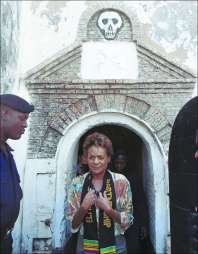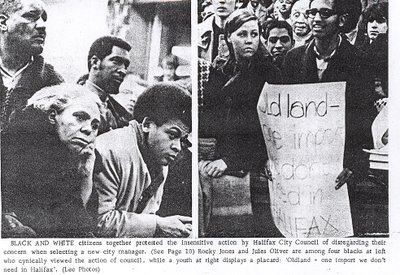NEVER AGAIN!

‘We shall never be chained again’
Jean weeps during visit to slave castle in Ghana
November 30, 2006 Halifax Chronicle Herald
By ALEXANDER PANETTA
ELMINA, Ghana — Michaelle Jean wept softly for several minutes Wednesday as she stared out from a seaside castle that still literally reeks from the stench of slavery.
The passing of generations has not erased the fetid trace of bodily waste in the dark, dank dungeons of Elmina castle where tens of thousands of human beings were stored like cattle.
The Governor General triggered a chain reaction of tears from her entourage as she broke into sobs while touching the rusty iron gate of the so-called the Door of No Return.
For more than three centuries, the chains of African captives scraped the rugged stone floor as they were shoved onto ships waiting below to carry them into slavery.
Jean gently touched the gate, then grabbed onto it tightly, and knelt as she wept for several minutes while praying in silence and gazing from the dark cellar into the sunlit horizon.
She said she prayed for millions of slaves, including her own ancestors, and for the untold millions who died during the journey and whose corpses were dumped into the ocean.
"My life will never be the same again," said Jean, the Haitian-born descendant of slaves.
"I said one thing (during my prayer): we shall never be chained again. We shall never be on our knees again. We shall never be humiliated again."
Upon emerging from the castle, the Governor General shook her head and waved off staff who attempted to set up a news conference with Ghanaian and Canadian media.
A moment later she regained her composure and changed her mind.Jean then delivered an eight-minute monologue without a single reference to the joyful irony that a slaves’ descendent would return here as vice-royalty.Jean was asked if she had a message for Canada’s black community and declined to offer one.
Instead she spoke about what she called modern-day slavery: the children who are forced into armies around the world, or to work for little or no pay.
"This doesn’t concern just the descendants of slaves," she said when asked for a reaction. "There are still children who are enslaved. I know that slavery is still a reality today."
"We can’t say that we’re unaware this is happening . . . Indifference is guilt. Indifference is a killer ..."
"Not only would we betray the people still living in those conditions . . . we would also be betraying ourselves."
A half-hour helicopter ride from the Ghanaian capital of Accra, Elmina Castle was first established as a Portuguese trading post in 1482 to exchange European goods for African gold.
But it was soon overtaken by the slave trade and served that sole purpose under the Portuguese, Dutch and British until the practice ended in the 1830s.It has found a new vocation as a shrine to inhumanity.
Africa must ‘learn from the lessons’ of slavery
November 29, 2006 Halifax Chronicle Herald, page A7
By ALEXANDER PANETTA
ACCRA, Ghana — Michaelle Jean told an African audience Tuesday that the continent must recognize its own role in the slave trade to help turn the page on a shameful chapter in history.
The Governor General used a state dinner to congratulate Ghana’s government for offering such an apology and suggested other African countries should do the same.
She made the remarks on the eve of an emotional pilgrimage to a seaside fortress where thousands of slaves were shipped to the Americas."The time has come to recapture that moment of African history in order to move ahead together," Jean said in a speech.
"As it looks to the future, Ghana has shown that it is willing to confront the past.
"I am impressed by your government’s decision to apologize for what was done hundreds of years ago by the people of this region involved in the slave trade."More than 15 million men, women and children were captured and sold to Europeans during the colonial age and crammed onto wooden ships bound for the Americas.
Ghana was a major hub of the international slave trade concentrated in West Africa, and the national government has recognized the role Africans here played.
"As a descendent of slaves, that touched me very much. I know that we cannot go back and solve past injustices. All we can do is learn from the lessons of the past, even the painful lessons, and use that knowledge to build a better future."Jean will visit Elmina Castle today and step up to its so-called Door of No Return, the infamous final spot where the captured natives were taken from African soil.
Jean said she planned to gaze at the ocean and reflect on what happened there."I will think of the millions of people packed tightly in rickety ships bound for unknown lands. Faraway lands where they were deprived of their memories, of their languages, of their heritage, of their dignity and, most of all, of their freedom," she said.
"I will stand and pray for those who never completed the journey and whose bodies were thrown out to the ocean."
"As I will stand there and reconnect with the land of my ancestors, I will salute your openness and I will accept your apology."
Ghanaian President John Agyekum Kufuor gave an extremely detailed account of the history of slavery to an international conference in July, where he drew attention to historical facts that many Africans would rather forget.
He described how Phoenicians and Greco-Romans had been enslaving Africans thousands of years ago and how Africans themselves profited from the trade with Europeans.


